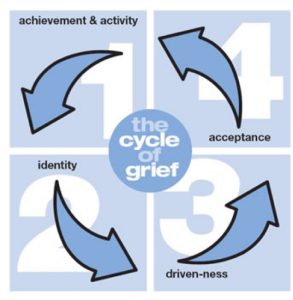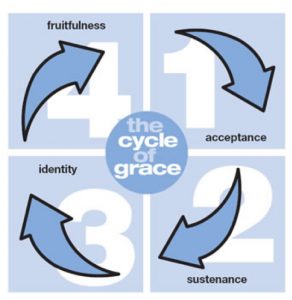‘Ben hurries his thinking, his speech, and his movements. He also strives to hurry the thinking, speech, and movements of those around him; they must communicate rapidly and relevantly if they wish to avoid creating impatience in him…
…Planes must arrive and depart precisely on time for Ben; cars ahead of him on the motorway must maintain a speed that he approves of; there must never be a queue of persons standing between him and a bank clerk, a restaurant table, or a rail ticket office. He is infuriated whenever people talk slowly, when planes are late, cars dawdle, and queues form.’ (1)
Ben has ‘Hurry Sickness’ – the feeling of being tyrannised by the urgent. He is a caricature, but I identify with him rather more than I would care to admit, and I’m sure I’m not alone in that – even if we don’t all have it as badly as Ben. Bestseller lists are filled with such ‘optimistic’ titles as How to be a Productivity Ninja, and Scrum: The Art of Doing Twice the Work in Half the Time. Publishers provide parents with ‘one-minute bedtime stories’ and lifts have non-operative ‘close door’ buttons to give impatient executives the illusion that they are in control.
Hurry Sickness is highly contagious. It has the curious side-effect of the sick thinking that they are well whereas those without the disease are given the impression, from those infected, that there is something very wrong with them. Hurry Sickness is a disease that affects our minds and our bodies, yet it may well have spiritual roots. To understand this disease more fully, we need to investigate the sources of infection.
Source 1: The scarcity mentality
Many of us possess a deep-seated belief that we don’t have enough time. ‘Our first waking thought of the day is “I didn’t get enough sleep.” The next one is “I don’t have enough time.” … This mindset of scarcity lives at the very heart of our jealousies, our greed, our prejudice, and our arguments with life …’ (2). As Brene Brown points out in Daring Greatly, ‘scarcity doesn’t take hold in a culture overnight. But the feeling of scarcity does thrive in shame-prone cultures that are deeply steeped in comparison and fractured by disengagement’.
Source 2: Entrainment
‘Entrainment’ is the idea that we pick up our rhythms and pace from those around us. David Kundtz in Stopping describes it like this: ‘We are all riding on a very fast train that is travelling down a predetermined track, gathering speed as it goes, and we have been on it for a long time. Many of us want to slow down; some want to get off the train. Others are so used to the speed that they don’t notice it. The few who love the speed are the only ones who get their way. Most of us stare blankly out of the window, barely seeing the world flying by and feeling helpless.’ We may talk a great deal about being individuals but we are deeply influenced by the culture of our workplaces and cities. No wonder the Apostle Paul instructs us not to be conformed to the pattern of this world (Romans 12:1-2).
Source 3: Orphan mentality
Jesus speaks to his disciples saying ‘I will not leave you as orphans; I will come to you’ (John 14:18). The Greek word used for ‘orphans’ here means ‘someone who doesn’t have a father’, yet we know that this was not the case for many of the disciples. Jesus cannot therefore have been speaking literally but using the word in a spiritual sense. An orphan identity is one of self-sufficiency and independence. We show ourselves to be spiritual orphans whenever we attempt to justify our existence and prove our acceptability through achievement and activity. It leads to an unending cycle of grief – because no achievement or amount of activity can fully satisfy our need for acceptance. In our society, increasingly ‘you are what you do (and get paid for)’. We all too easily draw our identity from our work and our need to succeed in this context creates a drive to be accepted. We may talk about wanting to get off the bullet train of Western society, but the reality is that we are afraid – afraid of being a nobody. Who are you, who am I, when we stop? Until we can find a satisfying answer to this question, our Hurry Sickness will persist.
Channels of healing
‘Are you tired? Worn out? Burned out on religion? Come to me. Get away with me and you’ll recover your life. I’ll show you how to take a real rest. Walk with me and work with me – watch how I do it. Learn the unforced rhythms of grace. I won’t lay anything heavy or ill-fitting on you. Keep company with me and you’ll learn to live freely and lightly’ (Matthew 11:28-30, The Message). If Hurry Sickness is caused by our thinking and beliefs about time and identity and made worse by our entrainment, then only in a change of mind (repentance) and a new identity will we find a cure.
Abundance
If we are to challenge and dethrone the belief that there isn’t enough time, then we have to take a good look at the character of God, who created time. In so doing, we see all around us that God is a God of abundant blessing. Millions of seeds, but only a few may be germinated. Millions of planets, but only one may be inhabited. Five thousand fed, and twelve baskets left over. Is it possible that this abundantly generous God should be stingy in only one area of his creation – time? That he should have deliberately withheld much needed extra hours in a day? That he should have ‘prepared in advance, good works for us to do’ (Ephesians 2:10) and yet not given us enough time to do them?
No! God has given us more than enough time – even time to waste! But can we believe it and start to live it?
Working from rest
In the Old Testament, we learn that God followed up his work of creation by resting on the seventh day. Since Christ’s resurrection, Christians have adopted Sunday, the first day of the week, as their day of rest: in another example of his abundant provision, God has given us time to stop before we begin! This is time in which we can regain his perspective on who he is, who he created us to be, our redemption, and what it means to be channels of his blessing into this fallen world. What better way to start the week? In practice, it is also the time when we can lay the forthcoming week before God and seek his wisdom and guidance – only then can we say ‘yes’ without reservation and ‘no’ without guilt. But are we guilty of rushing into the week, too anxious to fulfil our own agenda and so failing to seek his? ‘In repentance and rest is your salvation, in quietness and trust is your strength’ (Isaiah 30:15).
Adopted as children
‘For you did not receive a spirit that makes you a slave again to fear, but you received the Spirit of sonship. And by him we cry, “Abba, Father”. The Spirit himself testifies with our spirit that we are God’s children’ (Romans 8:15-16). The knowledge that we are adopted as God’s children through Christ’s death and resurrection frees us from having to earn our acceptance through achievement and activity. Again, God’s blessing and mercy precede everything else: we start from a place of acceptance, belonging, and security. As we sustain our relationship with God through worship, prayer, Bible reading, and fellowship, we become secure in the knowledge of God’s love for us – and this is our true identity. As we remain in that love, and obey Christ’s commands, we cannot help but be fruitful, for ‘this is to my Father’s glory, that you bear much fruit, showing yourselves to be my disciples’ (John 15:8).
The Great Physician brings healing for Hurry Sickness. As we live in the knowledge of his unconditional love and look out at the world from the security of his embrace, then we hear the pace of his heartbeat, and learn the unforced rhythms of grace.
Notes:
- Adapted from Faster by James Gleick. (London, Little, Brown and Company, 1999)
- The Soul of Money by Lynne Twist


Bev Shepherd
Bev Shepherd is the PrayerWorks project leader and an LICC associate speaker. As a management trainer and coach she specialises in the areas of leadership, team dynamics and stress, and is the author of Insight into Stress published by CWR.


Really helpful article Bev. How true that our abundantly generous God would not leave us short of time. These are truths we desperately need to learn.
Thank you